|
|
|
Sort Order |
|
|
|
Items / Page
|
|
|
|
|
|
|
| Srl | Item |
| 1 |
ID:
129205
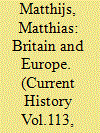

|
|
|
|
|
| Publication |
2014.
|
| Summary/Abstract |
After a tumultuous professional marriage of just over 40 years, Britain and Europe are facing the possibility of divorce. In January 2013, Prime Minister David Cameron decided to celebrate Britain's 40th anniversary as a member of the European Union by pledging a fundamental renegotiation of his country's terms of membership. Cameron further promised to submit any renegotiated deal to a clear "in-or-out" referendum in 2017 on whether or not to leave the EU, assuming his own Conservative Party wins a majority in the next general election in May 2015. Egged on by his party's growing ranks of restive Euroskeptics and trying to fight off a challenge on his right flank from populist Nigel Farage's UK Independence Party (UKIP), Cameron rolled the dice. He hoped to settle once and for all the Europe question, which has so often cast a dark shadow over the political debate in Westminster and Whitehall. Renegotiating
|
|
|
|
|
|
|
|
|
|
|
|
|
|
|
|
| 2 |
ID:
124418
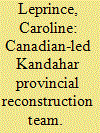

|
|
|
|
|
| Publication |
2013.
|
| Summary/Abstract |
The record of the Canadian-led Provincial Reconstruction Team (PRT) in Kandahar province, Afghanistan, provides a unique opportunity to evaluate the efficiency of Canada's recently adopted whole-of-government approach to conflict situations. This study maps the evolution of the interagency dynamics of Canadian departments and agencies during their six-year involvement with the PRT, and reveals that the Canadian-led PRT had to undergo significant changes before real interdepartmental collaboration actually could take place. While the first two years of the implementation of the whole-of-government approach have been described as a failure, this article argues that the publication of the Independent Panel on Canada's Future Role in Afghanistan was the turning point that significantly improved interagency collaboration in the PRT.
|
|
|
|
|
|
|
|
|
|
|
|
|
|
|
|
| 3 |
ID:
130177
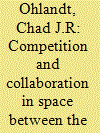

|
|
|
|
|
| Publication |
2014.
|
| Summary/Abstract |
U.S. national security space policy has recently shifted significantly toward increased international cooperation. Australian space activities have been reinvigorated, but remain underfunded. China's space activities remain vigorous, but largely unilateral. Given U.S. policy changes, opportunities for cooperation and collaboration among all three have improved.
|
|
|
|
|
|
|
|
|
|
|
|
|
|
|
|
| 4 |
ID:
132723
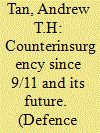

|
|
|
|
|
| Publication |
2014.
|
| Summary/Abstract |
Recent US experience in Iraq and Afghanistan has proven that COIN, however revised and updated to fit the globalised era in which we live, is a problematic and ineffective solution to the irregular warfare waged by insurgents. The United States and the West in general will have to accept the chastening lessons of Iraq and Afghanistan lest they repeat it: that they are not good at waging COIN and must try to avoid getting involved in such costly campaigns again. If intervention abroad has to be undertaken, it will have to fulfill a set of demanding conditions. Nonetheless, while COIN in its contemporary guise has failed to deliver long-term, tangible results, thinking about how to counter asymmetric challenges, including the waging of irregular warfare, cannot be ignored, given the likelihood that external interventions will continue to be required in the future. Moreover, while COIN as the basis of a grand strategy is unrealistic, some of its basic principles are useful in orientating future approaches to insurgencies and terrorism towards comprehensive and collaborative approaches, as opposed to merely hard security operations unilaterally undertaken by States, which fail to address the underlying fundamental causes of political violence and which undermine long-term legitimacy
|
|
|
|
|
|
|
|
|
|
|
|
|
|
|
|
| 5 |
ID:
132721


|
|
|
|
|
| Publication |
2014.
|
| Summary/Abstract |
space systems play an important role in sustaining the development, prosperity and security of many nations. As more nations become critically reliant on space systems, questions of maintaining safety and strategic stability in outer space have come to the fore. Transparency and Confidence-Building Measures (TCBMs) for outer space activities have an important role to play in providing clarity about the intentions of States and in articulating norms of behaviour in outer space. TCBMs take several forms. They may be the elaboration of basic principles related to the exploration and use of outer space, political measures related to establishing norms of conduct, information-sharing activities to improve the transparency of outer space activities, operational practices which demonstrate a commitment to mutual cooperation in outer space, or consultative mechanisms. We present an analytical framework for evaluating potential TCBMs and illustrate the application of this framework to examples of potential operational, regulatory, treaty-based and declaratory TCBMs.
|
|
|
|
|
|
|
|
|
|
|
|
|
|
|
|
| 6 |
ID:
130899
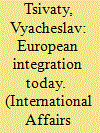

|
|
|
|
|
| Publication |
2014.
|
| Summary/Abstract |
It so happens that we are witnesses to the great geopolitical changes, where one political and economic system is replacing another, where the boundaries of political regions and alliances are shifting, and where the system of international relations is institutionalizing, integrating and transforming. A key characteristic that defines the development vectors of countries in the post- Soviet space is the search by newly independent states for an attractive integration nucleus. On the whole, from all indications, the process of the formation of a more or less stable system of foreign political ties between the post-Soviet states is complete. This accounts for the prevalence of the selective integration vector, namely, the fact that collaboration along the lines of the Customs Union and the EU has taken center stage.
|
|
|
|
|
|
|
|
|
|
|
|
|
|
|
|
| 7 |
ID:
138538
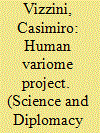

|
|
|
|
|
| Summary/Abstract |
One way to address the global challenges of public health in developing countries is through international collaboration to share data. It’s important to do this not just for humanitarian reasons but because open information is at the heart of scientific progress. One field in which this is particularly evident is genomic research, which has made revolutionary progress in recent years. Since the first genetic variation causing inherited disease (sickle-cell anemia) was defined at the protein level sixty years ago,1 it has become possible to locate, isolate, sequence, and clone individual genes. Indeed, there has been an explosion in research to discover the function of each of the twenty thousand or so human genes.
|
|
|
|
|
|
|
|
|
|
|
|
|
|
|
|
| 8 |
ID:
132729
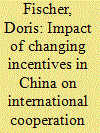

|
|
|
|
|
| Publication |
2014.
|
| Summary/Abstract |
Over the past three decades, China's fast economic development has induced considerable changes in China's university and research institution landscape, research financing and academic career incentives. This paper argues that these changes have affected the motivation and the ways in which Chinese scholars engage in international research cooperation. Most recently it has been observed that strong pressures on scholars and scientists - especially at leading academic institutions - to excel in international publications while simultaneously fulfilling their obligation to generate income for their institutions can lead to a dilemma with regard to international research cooperation: Those institutions and scholars most interesting for foreign scholars to cooperate with may be the ones with the least amount of both incentive and time to enter into serious cooperation. This article invites us to reflect on the implications of these changes in the incentive structure for cooperation in social science research on China.
|
|
|
|
|
|
|
|
|
|
|
|
|
|
|
|
| 9 |
ID:
035422
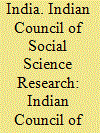

|
|
|
|
|
| Publication |
New Delhi, Indian Council of Social science Research, 1980.
|
| Description |
185p.pbk
|
| Series |
Publication no.; 119
|
|
|
|
|
|
|
|
|
|
|
|
Copies: C:1/I:0,R:0,Q:0
Circulation
| Accession# | Call# | Current Location | Status | Policy | Location |
| 019089 | 300.05/IND 019089 | Main | On Shelf | General | |
|
|
|
|
| 10 |
ID:
130407


|
|
|
|
|
| Publication |
2014.
|
| Summary/Abstract |
Budgetary pressures have driven a steady expansion of armaments collaboration projects internationally. This has also been the case in Europe where it is estimated that currently one-fifth of European procurement budgets are spent on collaborative weapons systems and the European Defence Agency has the long-term objective of increasing this figure by over 50%. The purpose of this article is to assess whether collaborative armaments projects can offer the benefits frequently attributed to them. To this end, the study examines the five combat aircraft projects that European states have collaboratively undertaken since the 1950s.
|
|
|
|
|
|
|
|
|
|
|
|
|
|
|
|
| 11 |
ID:
132732
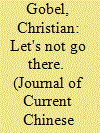

|
|
|
|
|
| Publication |
2014.
|
| Summary/Abstract |
Field research in China often requires the researcher to cooperate with two kinds of actors: research collaborators, such as those at universities or official think tanks, and local officials. These actors facilitate or enhance field access, but such access comes at the price of a potential "pre-selection bias" in data collection. Some scholars have argued that dependence on these "gatekeepers" introduces a significant bias into research outcomes. I argue, however, that the constraints faced by China scholars in their field studies are not absolute, but function by degree. The CCP is monolithic neither in its organization nor in the thoughts of its agents, and close collaboration with local partners can help remove normative bias rather than necessarily introducing it. Most importantly, an argument built exclusively on the power of structural constraints discounts China scholars' most crucial abilities: to learn, to think critically and to research holistically.
|
|
|
|
|
|
|
|
|
|
|
|
|
|
|
|
| 12 |
ID:
132688
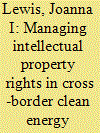

|
|
|
|
|
| Publication |
2014.
|
| Summary/Abstract |
This paper examines how the United States and China are implementing the most ambitious model of bilateral clean energy technology cooperation to date: The U.S.-China Clean Energy Research Center (CERC). It finds that the CERC has been able to generate new IP through RD&D activities, though minimal IP has come from collaborative activities involving both U.S. and Chinese participants. Many participants reported that the CERC's Technology Management Plan (TMP) mitigated their IP concerns, though few have tested its efficacy or enforceability. While it is too early to comprehensively assess the efforts of the CERC, it is increasingly evident that the CERC provides a model for collaborative clean energy RD&D that is unique in the history of U.S.-China collaborations in this area. The TMP may ultimately play an important role in building trust among the consortia participants, which could lead to even more constructive collaborations in the future, and serve as a model for future bilateral cooperation agreements. Without sustained support, and continued attention to IP concerns, it will be even harder for China and the United States to make progress towards true cross-national research collaborations which ultimately could produce considerable global benefits, particularly in the clean energy field.
|
|
|
|
|
|
|
|
|
|
|
|
|
|
|
|
| 13 |
ID:
131055
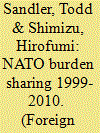

|
|
|
|
|
| Publication |
2014.
|
| Summary/Abstract |
Motivated by US Secretary of Defense Robert Gates' farewell address to NATO, this article investigates whether NATO burden-sharing behavior has changed during the last ten years. Based on a Spearman rank correlation test, we find almost no evidence that the rich NATO allies shouldered the defense-spending burden of the poor allies during 1999-2009. In 2010, there is the first evidence of the exploitation of the rich. When allies' defense burdens are related to defense benefit proxies, a Wilcoxon test finds that there is no concordance between burdens and benefits after 2002. This is indicative of a less cohesive alliance, in which allies are not underwriting their derived benefits. We also find that allies' benefits, which are tied to their exposed border protection and terrorism risk, motivate defense spending. Allies' benefits, based on economic base and population, are less of a driver of defense spending for most NATO allies. We devise a broad-based security expenditure burden that accounts for defense spending, UN peacekeeping, and overseas foreign assistance. In terms of this security burden, there is evidence of the exploitation of the rich by the poor beginning in 2004. Our findings indicate a two-tiered alliance that faces significant policy challenges.
|
|
|
|
|
|
|
|
|
|
|
|
|
|
|
|
| 14 |
ID:
129856
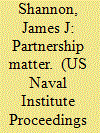

|
|
|
|
|
| Publication |
2014.
|
| Summary/Abstract |
Relationship with international navies have tangible benefits, especially in acquisition, and create a 'win-win-win' for everyone.
|
|
|
|
|
|
|
|
|
|
|
|
|
|
|
|
| 15 |
ID:
133415
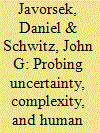

|
|
|
|
|
| Publication |
2014.
|
| Summary/Abstract |
Geopolitical dynamics associated with nuclear proliferation, the Arab Spring, the rapid rise of Chinese power, an oil-fueled Russian resurgence, and the post-Afghan and Iraq eras will demand significant changes in intelligence focus, processes, and resources. Nearly a decade after intelligence failures required a restructuring of the Intelligence Community with mandates for a scientific approach to intelligence analysis, current efforts continue to focus on overly deterministic individual analyst methods. We argue for a process-oriented approach to analysis resembling the collaborative scientific process successful in other professions that is built on shared theory and models. After demonstrating that events in the real world are path dependent and contingent on deterministic and random elements, we highlight the role of uncertainty in intelligence analysis with specific emphasis on intelligence failures. We then describe how human agency in an interconnected and interdependent system leads to a landscape of dancing strategies as agents dynamically modify their responses to events. Unfortunately, the consequences of the present deterministic intelligence mindset are significant time delays in adjusting to emerging adversaries leading to an increased susceptibility to intelligence failures. In contrast with the existing analyst-centric methods, we propose a risk management approach enhanced by outside collaboration on theory and models that embrace lessons from the twentieth-century science of uncertainty, human agency, and complexity.
|
|
|
|
|
|
|
|
|
|
|
|
|
|
|
|
| 16 |
ID:
132708
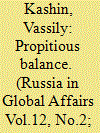

|
|
|
|
|
| Publication |
2014.
|
| Summary/Abstract |
The Ukrainian crisis has demonstrated once again that the global Chinese business empire is growing much faster than Beijing's military-political capabilities. There has again emerged a need for a more active Chinese policy to protect national interests.
|
|
|
|
|
|
|
|
|
|
|
|
|
|
|
|
| 17 |
ID:
132042
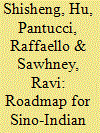

|
|
|
|
|
| Publication |
2014.
|
| Summary/Abstract |
A NATO and Western powers begin to take a backseat in Afghanistan 's future, one of the most pressing questions is what role the region can play in helping Afghanistan to become a prosperous and stable nation. Numerous efforts are already underway through multilateral and bilateral forums, yet the key to regional cooperation for Afghanistan' s future lies through closer interaction between Beijing and New Delhi. Drawing on a research project spanning a number of workshops in Beijing, New Delhi and Qatar and involving influential thinkers and experts from China, India, the UK and Afghanistan, this paper will try to map out specific ideas that policymakers in Beijing and New Delhi can explore as avenues of cooperation. Post-2014 Afghanistan will remain a major regional concern for at least the short to medium term. The earlier China and India can develop workable collaborative undertakings, the sooner they can forge a stable and prosperous neighbourhood.
|
|
|
|
|
|
|
|
|
|
|
|
|
|
|
|
| 18 |
ID:
124214
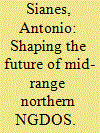

|
|
|
|
|
| Publication |
2013.
|
| Summary/Abstract |
In recent years the financial crisis in traditional donor countries, the aid effectiveness debate and the approaching end of the Millennium Development Goals agenda have opened the door to new goals, instruments and actors in development. This is shaping a new and more complex global aid system. As a consequence, traditional actors like mid-range Northern ngdos (nngdos), born and raised in an oda-based development system, face a challenging scenario. This paper has two aims. First, it aims to summarise the 10 most important challenges nngdos face today. As will be shown, such a complex landscape calls for adaptation, especially if nngdos want to keep playing a key role in the development aid system. The second aim therefore is to present 10 proposals which could help nngdos to overcome these threats, shaping the future this relevant actor could play in the new global aid system.
|
|
|
|
|
|
|
|
|
|
|
|
|
|
|
|
| 19 |
ID:
132872
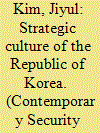

|
|
|
|
|
| Publication |
2014.
|
| Summary/Abstract |
The strategic culture of the Republic of Korea (ROK or South Korea) is based on three pillars: attaining prosperity and strength as an enduring national purpose and objective; countering the existential North Korean threat; and maintaining a strong alliance with the United States. This strategic culture is grounded in history, especially in Koreans' sense of themselves as an ancient and homogeneous people, the minjok, and in a constructed martial heritage. Keepers of strategic culture include the national security establishment, the National Assembly, the media, the public, and the United States, but the most important keeper is the president, who ultimately defines South Korea's strategic interests and how they should be attained or guarded. Contemporary illustrations of South Korean strategic culture in action include defence reform measures, shifts in the American alliance, and the 'crisis of 2013', which included a North Korean nuclear test and extreme threats of war. This article reinforces the view that while strategic culture may be a universal concept, in its operationalized and practised form, the true value of the concept is that the unique and particularistic characteristics that define each specific strategic cultural tradition are placed at the centre of analysis. South Korea's strategic culture is unique, but if there is an aspect that can be applied to other nations it is that shared historical memory and public historiography are crucial factors that inform that nation's strategic culture
|
|
|
|
|
|
|
|
|
|
|
|
|
|
|
|
| 20 |
ID:
130909
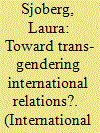

|
|
|
|
|
| Publication |
2012.
|
| Summary/Abstract |
This article engages with trans-theorizing to show how International Relations (IR) is currently blind to gender diversity, and the conceptual contributions trans-theorizing could make. To do so, it asks what insights trans-theorizing might provide for the study of global politics generally, and for feminist theorizing about gender in global politics specifically. After briefly introducing the terminology of trans-theorizing, the article addresses the potential for (and potential hazards of) an alliance between trans-theorizing and feminist theorizing in IR. The article then discusses several potential contributions of trans-theorizing-including hyper- and in-visibility, liminality, crossing, and disidentification-which provide explanatory leverage for IR. The article concludes with some suggestions for further collaboration between trans-theorizing and (feminist) IR to deepen and widen IR's work on gender specifically, and global politics generally.
|
|
|
|
|
|
|
|
|
|
|
|
|
|
|
|
|
|
|
|
|